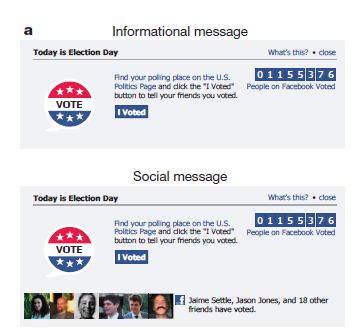Facebook study shows your influence over election votes

Online social networks can affect important real world behaviour. Behaviour such as the upcoming presidential election in the US.
The Facebook Data Science team has been running a study in conjunction with the University of California in San Diego.This study shows the ‘power friends play in mobilizing important offline behaviours’. Facebook announced the results of this ‘long standing collaboration’ yesterday.
The results of the study are published in Nature this week. The results show that not only our friends, but the friends of our friends can influence us..
This massive scale experiment involving over 61 million people confirms that pressure from your peers can increase voter turnout.
In the study, 61,279,316 people over the age of 18 who logged on to Facebook in the US saw a social, non-partisan “get out the vote” message at the top of their news feeds on November 2nd 2010.

There were three groups in the experiment:
Most people (98 per cent) saw the ‘social message’. One per cent received the ‘informational message’ and one per cent received no message at all.
The social message featured a reminder that “Today is Election Day”. There was a clickable “I Voted” button in the middle of the box and a link to local polling places.
The box showed a counter displaying how many Facebook users had already reported that they had voted; and up to six profile pictures of users’ own Facebook friends who had reported casting their vote.
About 600,000 people, or one per cent of the total sample were randomly assigned to see a modified “informational message,” which was identical in all respects to the social message except for pictures of friends.
An additional 600,000, the remaining one per cent served as the control group and received no Election Day message from Facebook at all.
James Fowler, UC San Diego professor of political science in the Division of Social Sciences and of medical genetics in the School of Medicine said:
“Voter turnout is incredibly important to the democratic process. Without voters, there’s no democracy,”
“Our study suggests that social influence may be the best way to increase voter turnout. Just as importantly, we show that what happens online matters a lot for the ‘real world.”
Of course clicking on a link is not the same as actually getting out and voting in person. The team had to use statistics from the publically available voting records.
Rates of turnout were compared between users who said they had voted, but did not turn out in person. These rates were compared to voters that saw the message on Facebook and those that did not.
Voting attendance was highest for the group that saw the social message on Facebook.
The graph below shows the influences our friends have. 868 users who listed Abilene, Texas who logged into Facebook on election day and who clicked on the ‘I Voted’ button are shown on the graph. The red nodes indicate the relationship between friends who clicked on the ‘I Voted’ button.
The voting message also worked on friends of friends, those with two degrees of separation from each other. Seeing the voting message on Facebook encouraged them to express that they had voted too.
Over 1.2 million close friends of close friends clicked the ‘I Voted’ button.
The researchers estimate that the direct effect of the Facebook social message on users who saw it generated an additional 60,000 votes in 2010.
But the effects of the social network -- of social contagion among friends -- yielded another 280,000 more giving a total of 340,000.
In other words, Fowler said, the social network yielded an additional four voters for every one voter that was directly mobilized.
"Whether we want to get out the vote or improve public health, we should not only focus on the direct effect of an intervention, but also on the indirect effect as it spreads from person to person to person.”
The effect of this research has been published just in time for Facebook to capitalise on the upcoming presidential election and associated advertising revenue this brings.
If we can influence the friends of our friends, think of the opportunity that an effective marketing campaign could bring to advertisers.
It might have far greater consequences than just advertising. The report notes that:
‘In the 2000 US presidential election, George Bush beat Al Gore in Florida by 537 votes (less than 0.01 per cent of votes cast in Florida). Had Gore won Florida, he would have won the election’.
If Facebook had been around then and been able to influence our voting behaviour for the presidential election in 2000, history might have been completely different.